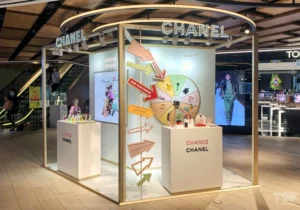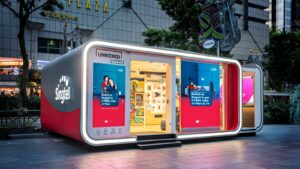We had an interesting conversation with Jarred Abbott, CEO of A2Z Events about the importance of Pop-up events and how they have become an excellent way to introduce new products and services to the market.
As businesses continue to look for new and innovative ways to get in touch and engage with their target audience and ultimately, stand out from their rivals, one marketing strategy that has gained immense popularity in recent years is the Pop-up event. These temporary, immersive experiences offer a unique opportunity for businesses to connect with customers.
Pop-up events have also somewhat become the lifeblood of modern marketing. They create buzz, offer hands-on experiences, and drive engagement. Especially today where we all need to cut through the digital noise, these events provide a tangible, memorable touchpoint that can captivate audiences and showcase innovation in ways that traditional methods simply can’t match
Product Launches

Pop-up events are an excellent way to introduce new products or services to the market, and this direct interaction with customers can help provide insights that are invaluable for refining your product and marketing strategies.
According to Jarred, a successful product launch pop-up can lead to immediate sales and valuable customer feedback. It can also strengthen your brand’s presence and help establish your product in the market.
Experiential Marketing
Experiential marketing is all about creating memorable experiences that leave a lasting impression on customers. This could be anything from interactive art installations to themed escape rooms that align with your brand.
Pop-up events can be designed to immerse attendees in a brand’s world, allowing them to interact with products, participate in activities, and forge emotional connections.
“Creating a memorable experience can significantly enhance brand recall and emotional connection with your customers. It encourages social media sharing, which increases your brand’s visibility. This type of engagement often leads to higher customer retention and positive word-of-mouth,” says Jarred.

Exclusive Sales or Promotions
Limited-time pop-up shops or sales events can create a sense of urgency and exclusivity, driving foot traffic and boosting sales.
These events can be tailored to specific target audiences, offering unique products, discounts, or limited-edition items.
Collaborations and Partnerships
Pop-up events provide an excellent opportunity for businesses to collaborate with complementary brands or influencers.
By combining their respective audiences and leveraging each other’s strengths, businesses can reach new customers and create unique experiences.
“Partnerships leverage the strengths and customer bases of both brands, creating a mutually beneficial relationship,” says Jarred.
Community Engagement
Pop-up events can be used to foster community engagement and build brand loyalty.
From hosting workshops or educational sessions to organizing charity events or community gatherings, businesses can position themselves as active members of their local communities and strengthen their relationships with customers.
Jarred says: “These events foster a sense of community and loyalty towards your brand. They enhance your reputation as a business that cares about its customers and their community. This can lead to increased word-of-mouth referrals and a loyal customer base that supports your business in the long run.”
Tips for effective Pop-up event execution
To maximize the impact of pop-up events, businesses should consider the following tips:
Strategic location: Choose a high-traffic location that aligns with your target audience and event objectives. Consider factors such as foot traffic, visibility, and accessibility.
Compelling branding and design: Create a visually appealing and cohesive brand experience that captures attention and leaves a lasting impression. Invest in eye-catching displays, signage, and decor that reflect your brand’s personality.
Engaging activities and experiences: Incorporate interactive elements, demonstrations, or hands-on activities that encourage attendees to actively participate and engage with your brand.
Social media integration: Leverage social media platforms to promote your pop-up event, share updates, and encourage attendees to share their experiences using relevant hashtags and tagging your brand.
Data collection and follow-up: Collect contact information from attendees to nurture leads and maintain relationships after the event. Consider offering incentives or exclusive offers to encourage sign-ups.

